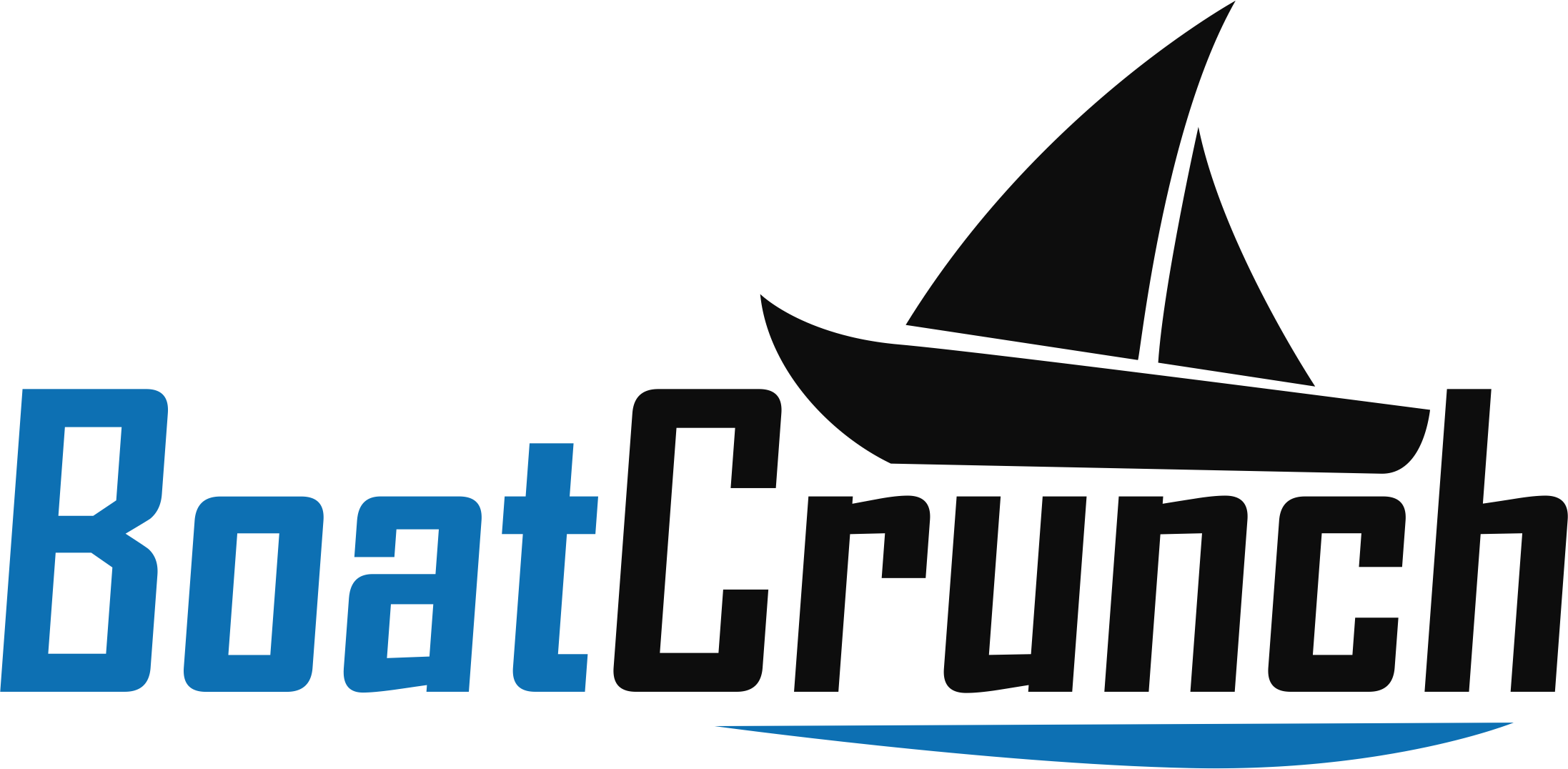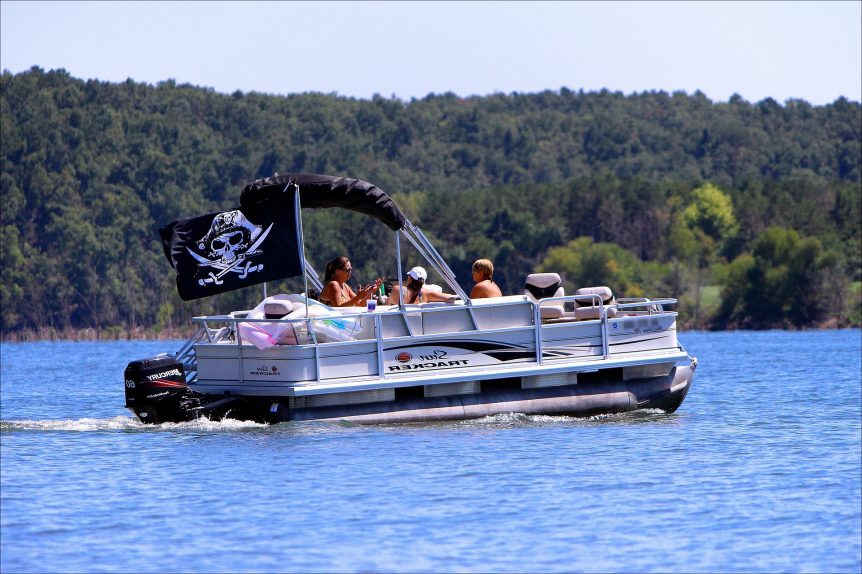In this article, I’ll be explaining the average pontoon boat weight. I’ll also be providing you with examples of some popular, well-known pontoon boats. These examples can be used for reference.
Most of the time you can get the exact weight of the boat from its seller or manufacturer. However, if you’ve purchased your boat second hand from another individual then they may not be able to provide you with an exact number.
The weight of a pontoon boat can vary vastly depending on whether you’ve made modifications to the boat or It’s sustained any damage during it’s use, and what you’re storing inside it.
Before purchasing a Pontoon Boat, it’s very important to understand the weight of one. The weight of a boat is a huge factor for when it comes to towing. You’ll need to take the weight of your boat into account when identifying a truck which will be used for transporting the boat. This is important as if your truck isn’t powerful enough to tow your boat, then you could have wasted several hundred dollars.
If you’re planning on purchasing a pontoon boat, you may also find this article on the average speed of a pontoon boat useful.
Average Pontoon Boat Weight
The average weight for a pontoon boat is 2,200 pounds (997.9032Kg). This estimate includes the weight of the motor. The average pontoon boat can also hold around 2,000 Pounds (907.1847Kg). This means that when it’s full, it will almost double in weight. A pontoon boat trailer will weigh around 1,200 pounds (544.3108Kg).
If you plan to tow your boat (Which you likely will) then you’ll want to calculate how much your empty boat will weigh with the added weight of the pontoon boat trailer. This will calculate to be around 3,600 pounds (1632.933Kg) on average.
Because of this, I’ll highly recommend that you use a vehicle with a towing capacity of at-least 6,000 pounds (2721.554Kg). You should always ensure that your truck is more than capable of pulling the weight of your boat and trailer. This will ensure that you are able to transport your pontoon boat safely without any risk of blowing your engine.
Examples of some Poon Boat Weights
- The Ambassador Rear Lounge 25 FT weighs 4,600 pounds whilst dry and has a weight cap of 2,900 pounds – fitting up to 14 people.
- The midrange Catalina LSZ Quad Lounge 22 FT Weighs 1,800 pounds whilst dry and has a weight cap of 2,035 pounds – fitting up to 10 people.
- The Avalon GS Cruise 25 FT Weights 2,450 pounds whilst dry and has a weight cap of 2,430 pounds – fitting up to 13 people.
Considerations When Towing a Pontoon Boat
A standard boat trailer weighs 400 pounds empty. That adds another 200 to 300 pounds once loaded with water, passengers, gas cans, coolers, and other equipment. You will want to consider how heavy your boat is and whether it has a draft. If your boat has a deep draft you will need a heavier tow vehicle.
Pontoon boats are often towed behind cars due to their narrow width. However, they tend to be lighter than other types of trailers. They are typically not designed to drive over rough surfaces.
If you must tow a boat over rough terrain, you will want to consider the maximum allowable towing capacity on the trailer. Most trailers have a maximum weight limit of 15,000 lbs. Some trailers have a maximum weight limit of 20,000 lbs., and some have a maximum weight limit of 25,000 lbs. Before buying a trailer look at the manufacturer’s recommended towing capacities and inspect the hitch that connects the trailer to the vehicle.

Other Factors Which Could Affect The Weight Of Your Boat
If you want a lightweight pontoon boat, but don’t want to compromise safety, then you need to consider a few factors that could affect the weight of your boat.
Some of the key considerations are:
- The material used
- The size of the boat
- the length of overall hull
- the capacity of the hold
To determine how lightweight your pontoon boat actually is, you need to take these factors into consideration and then find the right balance of safety and comfort.
There are many different types of boat materials that can be used to construct a pontoon boat. The most common ones include carbon fibre, Kevlar and polyethylene and aluminium composites. Each offers its own advantages and disadvantages, so you need to decide which is suitable for you and the type of conditions in which you intend to operate this boat.
You should also consider whether your boat needs to be fitted with a deck or not, depending on the style of boat you purchase.
Boat sizes vary considerably, so you will need to weigh up different options when choosing the size of your boat. Check out this article on the benefits of a small pontoon boat.
Conclusion
By overloading your boat above it’s maximum weight cap you could be putting yourself in danger. Just like you’d find yourself being pulled over by police for disobeying the law, you can also find yourself being pulled over by coast guards for overloading your boat.
It’s very important to the weigh of your pontoon boat and its maximum holding weight for numerous reasons. If you’re unsure of how much your boat weighs, then ask a professional or get in contact with it’s manufacturer/seller. If you have any further questions or feel as though I’ve left something out – feel free to leave a comment below.

My name Is Larry Noel, the voice behind BoatCrunch.
I’m a boating enthusiast that loves nothing more than being out on the water. So much so that I’ve acquired a Degree in Marine Biology (MB) as well as a degree in Ocean Engineering (OE).
I’m very familiar with a wide range of different boats and I’ve owned a variety of different boats myself however I have a particular obsession with Pontoon boats. I’ve lived all across the United States and always kept company in the form of boats and now my loving family.


Comments 1
Useful Guide! But can you include some weight examples of some smaller pontoon boats meant for couples and solo? thanks a lot